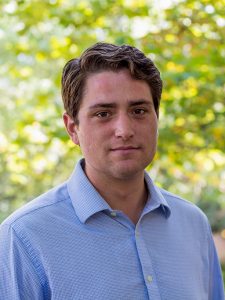
Atticus Jaramillo, a UNC-Chapel Hill doctoral student in city and regional planning, knows community is important. He works with a campus program focused on helping undergraduate students prepare for graduate school, which provides an opportunity to “pay forward the advantages I have been fortunate enough to receive,” he says.
Through his Ford Foundation Predoctoral Fellowship, Jaramillo is part of a different community, in which he learns about the research of other Ford fellows throughout the nation. Within his own research, Jaramillo investigates how community development initiatives and different types of housing can improve life for low-income families.
“The overarching goal of my research is to broaden public understanding of the social benefits of affordable housing and bolster support for publicly supported affordable housing,” he says. “I’m open to any career that allows me to pursue this goal, but I’m primarily interested in academic jobs because I love working with students.”
Read more of what he shared with Carolina Graduate School Magazine below:
Tell us about your background and why you chose Carolina for graduate school.
Unlike some students, my path to Carolina has been fairly conventional. I developed an early interest in city and regional planning through my undergraduate studies in history and political science. At the time, I was fortunate enough to have wonderful faculty mentors who encouraged me to pursue graduate studies to further my academic interests. The rest, as they say, is history!
After my undergraduate studies, I continued to a master’s program in urban planning at the University of Minnesota-Twin Cities. During my time in the Twin Cities, I worked as a researcher for a variety of governmental bodies and affordable housing organizations, including the University of Minnesota Extension, Minnesota Housing Finance Agency and the Minnesota Housing Partnership. These experiences sparked my interest in how publicly supported affordable housing can help address persistent patterns of racial segregation and social inequality in U.S. cities.
To further my academic interests, I decided to pursue a Ph.D. in city and regional planning at Carolina because it is home to some of the top housing scholars in the nation. Also, my fiancé and I desperately wanted to escape the cold!
What should people know about your research and career goals?
My research explores the relationship between housing policy and social inequality. I do most of my research under the advisement of Dr. William Rohe at the Center for Urban and Regional Studies (CURS). Currently, I am assisting with a project that merges administrative data from the U.S. Department of Housing and Urban Development (HUD) with data from the National Longitudinal Study of Adolescent to Adult Health. The main goal of this project is to explore how residence in HUD-assisted housing as a child influences a range of later-in-life health outcomes.
This CURS project is directly related to my current research, which focuses on how housing unaffordability and neighborhood disadvantage influence the health and well-being of low-income families. While many studies find that substandard housing and unsafe neighborhood environments can negatively impact the health of low-income families, less is known about what types of housing and community development programs mitigate these negative impacts. Through my work, I hope to address this gap.
The overarching goal of my research is to broaden public understanding of the social benefits of affordable housing and bolster support for publicly supported affordable housing. I’m open to any career that allows me to pursue this goal, but I’m primarily interested in academic jobs because I love working with students.
You have been active in the campus community, including the Initiative for Minority Excellence, the Moore Undergraduate Research Apprentice Program (MURAP), the Center for Urban and Regional Studies and the Carolina Center for Public Service. What does service to your UNC-Chapel Hill community provide to you?
Being a Ph.D. student can be a lonely endeavor – we spend a lot of our time alone, studying for the next test, writing the next paper. I stay involved in the UNC community because it allows me to connect with students and faculty who come from similar backgrounds, which makes the endeavor of a Ph.D. less lonely. These are also intellectually stimulating spaces, as many of the programs I’m involved with require me to exchange ideas with folks from other disciplines.
I’ve also been the beneficiary of several programs intended to help underrepresented students pursue graduate studies. Assisting with programs such as MURAP, which is a 10-week graduate school preparation program administered here at UNC, provides me with an opportunity to give back to these programs and pay forward the advantages I have been fortunate enough to receive.
You were selected for a three-year Ford Foundation Predoctoral Fellowship in 2018. How is your fellowship supporting your education and research at UNC-Chapel Hill?
I’m incredibly grateful to have received the Ford Foundation Predoctoral Fellowship. The fellowship is administered by the National Academies of Sciences, Engineering, and Medicine. The goal of the fellowship is to increase the diversity of the nation’s universities and colleges by supporting doctoral students from historically underrepresented groups. It does so by providing a three-year, non-service stipend, which means I don’t have to fulfill any specific responsibilities to receive funding. This gives me the flexibility to explore my academic interests, focus my energy on research, and pursue professional opportunities that I wouldn’t be able to as a teaching assistant or research assistant. Another major perk of the fellowship is that you get to attend an annual conference with other Ford fellows and learn about all their amazing work.
In short, it gives me the financial freedom to grow as a young scholar, which is an incredible gift.
